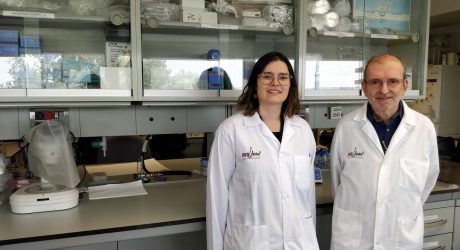IDIBGI-ICO study identifies a new target in the fight against metastatic cancer
- Silibinin, a natural molecule from milk thistle, blocks a key protein in cancer metastasis that has so far resisted therapeutic manipulation.
A study by the Girona Biomedical Research Institute (IDIBGI) and the Catalan Institute of Oncology (ICO) has identified an inhibitor of a key protein in the process of metastasis, the oncoprotein ID3. This is the first time that this protein, which until now had resisted therapeutic manipulation, can be inhibited with a natural compound to reduce the metastatic capacity of tumours.
The paper, published in the scientific journal Phytomedicine, describes how silibinin – a natural molecule from milk thistle – is able to effectively block the activation of the ID3 protein in specialised cells that line blood vessels in the brain. These cells are key in the establishment of brain metastases.
This study, promoted by the Metabolism and Cancer and the Precision Oncology research groups at IDIBGI and ICO, also shows that silibinin prevents the activation of ID3 in lung cancer cells, one of the tumours that causes the highest number of brain metastases in cancer patients. In this type of cancer, this protein is known to “reprogram” tumour cells to make them insensitive to current treatments. Activation of this protein also provides them with the “molecular passport” to travel to other parts of the body during the early stages of metastasis.
In the first steps of this research, the interaction between the ID3 protein and other genes in lung cancer patients was examined using bioinformatics tools. “We discovered that the ID3 protein has a strong connection with other specific proteins that govern the growth and repair of blood vessels, called BMPs. This suggests that ID3’s role in the metastatic spread of lung cancer could be blocked by acting on these pathways,” says Dr. Elisabet Cuyàs, IDIBGI senior researcher and co-leader of this publication.
The use of silibinin as a potential ID3 inhibitor was then proposed. Silibinin is a biocompound with anti-metastatic activity that these IDIBGI and ICO groups have investigated in numerous molecular and clinical studies. Thus, laboratory studies were carried out with cell models in which treatment with silibinin prevented ID3 activation triggered by these BMP proteins, not only in endothelial cells surrounding cerebral blood vessels, but also in lung cancer cells themselves.
“Silibinin achieves this by dampening the function of BMP protein receptors, thus preventing regulatory signals from reaching specific genetic regions that control ID3 expression, thus blocking its aberrant activation,” underlines Sara Verdura, who has outlined the molecular details of the whole process and is the first author of the study.
These findings were not only limited to culture plates and test tubes: “ID3 suppression with silibinin was also observed in animals treated with doses similar to those found in oncology patients taking silibinin-rich food supplements. In previous studies, we have already observed that they provide a clinical benefit to patients with brain metastases,” says Dr. Joaquim Bosch, head of the Precision Oncology group at IDIBGI and ICO, who co-led this publication.
However, the IDIBGI research teams have revealed in this study how silibinin could counteract one of cancer’s most elusive targets. “ID3 is a transcription factor that facilitates the spread of cancer, because it endows endothelial and cancer cells with stem cell-like characteristics. For this reason, it has been notoriously difficult to inhibit with current treatments,” stresses Dr. Javier A. Menéndez, head of the Metabolism and Cancer Group at IDIBGI and ICO, who has also co-led this publication.
This research demystifies the impossibility of inhibiting metastasis-enhancing transcription factors, such as the ID3 protein, using drugs. Furthermore, the study also reinforces the potential for clinical development of improved versions of silibinin as a new strategy to thwart the spread of tumour cells to other organs, a major challenge in the therapeutic prevention of metastatic cancer.
Reference article: Sara Verdura, José Antonio Encinar, Alexei Gratchev, Àngela Llop-Hernández, Júlia López, Eila Serrano-Hervás, Eduard Teixidor, Eugeni López-Bonet, Begoña Martin-Castillo, Vicente Micol, Joaquim Bosch-Barrera, Elisabet Cuyàs, Javier A. Menendez, Silibinin is a suppressor of the metastasis-promoting transcription factor ID3, Phytomedicine, Volume 128, 2024, 155493, ISSN 0944-7113, https://doi.org/10.1016/j.phymed.2024.155493.




